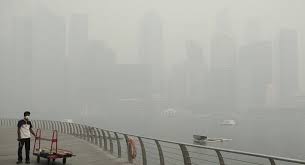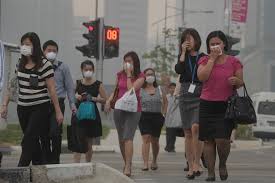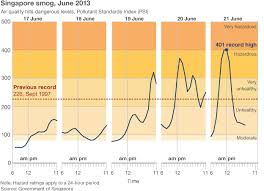See the 22 April AFP story below about the life-threatening smog enveloping Singapore. It comes (largely) from deliberately set fires on and around oil palm plantations in Sumatra, fires illegally set to facilitate land clearance.
You need additional information to read the story properly. Here it is. The story identifies two firms as largely responsible for the fires:
1. APP (Asia Pulp & Paper). The tale is too long to tell in detail here. Look it up in Asian Godfathers. Controlled by the Widjaya family, who defaulted on US$14 billion of debt (no, that is not a typing error) during the Asian crisis and then set out to buy the debt back at cents on the dollar. They did this by the most extraordinary acts of financial subterfuge, many of which were run through Singapore-based and Singapore-‘regulated’ institutions. A 2002 petition by creditors to the Singapore courts to have APP taken over and run by a local administrator was rejected. The Widjayas are serial law breakers. Where is their business run from? Singapore. Where did they hole up, and who protected them, after the Asian crisis? Singapore.
2. APRIL (Asia Pacific Resources International Holdings Ltd). Controlled by Sukanto Tanoto, who in the wake of the Asian crisis in 2006 was listed by Indonesian state bank Mandiri as one of its six biggest delinquent debtors. He owed Rupiah5.4 trillion. Tanoto was also under investigation for fraud at his own bank, Unibank, which after the Asian crisis was reported by regulators to have extended 51% of its loans to Tanoto firms; the maximum legal limit for loans to related parties was 20%. Tanoto is a serial law breaker. Where is his business run from? Singapore. Where did he hole up, and who protected him, after the Asian crisis? Singapore.
Finally, what is the east Asian market where it has been least possible to distribute Asian Godfathers since its publication in 2007 (way more difficult than in ‘authoritarian’ China). That’s right. Singapore!
Palm oil companies behind Singapore smog: Greenpeace
Fires on Indonesia’s Sumatra, which have cloaked Singapore in record-breaking smog, are raging on palm oil plantations owned by Indonesian, Malaysian and Singaporean companies, environmental activist group Greenpeace International said.
“NASA hotspot data in Sumatra over the past 10 days (11-21 June) has revealed hundreds of fire hotspots in palm oil concessions that are owned by Indonesian, Malaysian and Singaporean companies,” the group said in a statement received by AFP.
Singapore’s smog index hit the critical 400 level on Friday, making it potentially life-threatening to the ill and elderly, a government monitoring site said. On Saturday morning, the reading was at 323, still in the “hazardous” zone.
Parts of Malaysia close to Singapore have also been severely affected by the smog this week.
“Fires across Sumatra are wreaking havoc for millions of people in the region and destroying the climate. Palm oil producers must immediately deploy fire crews to extinguish these fires. But really cleaning up their act starts with adopting a zero deforestation policy,” said Bustar Maitar, head of Greenpeace Indonesia’s forest campaign.
The Indonesian environment minister Balthasar Kambuaya said Friday that a team has investigated eight companies suspected to be behind the fires and promised to reveal the companies’ names after the probe.
A senior presidential aide Kuntoro Mangkusubroto said Friday that the fires happened in concession areas belonging to Asia Pulp & Paper (APP) and Asia Pacific Resources International (APRIL).
“It is very clear that the fires are in APP concessions and APRIL. We need to settle this matter,” he told reporters while showing the distribution of fires from 1 to 18 June in concession areas in Riau.
APP, the world’s third-largest paper producer said in a statement late Friday that “ground verification” detected “only 7 points that are actually forest fire, affecting around 200 hectares of land”.
“They are under and being controlled by approximately a thousand fire fighting crews and their team. Our team’s preliminary investigation found that 5 of the fires were set by the community to clear land for crops and 2 cases are still under investigation”, APP added.
APRIL could not be reached for comment.
Indonesia stepped up its fire-fighting efforts Friday by deploying aircraft to artificially create rain and to water bomb the blaze.
The haze crisis has caused a dramatic escalation in tensions between tiny Singapore and its vast neighbour, with the city-state repeatedly demanding that Jakarta steps up its efforts to put out the fires.
More:



June 27, 2013 at 2:52 am
[…] http://joestudwell.wordpress.com/2013/06/22/singapore-reaps-what-it-sowed/ […]
July 19, 2013 at 8:10 am
Dear Mr Studwell,
We see that you’ve reposted an AFP article of 22 June in this commentary on the recent haze in Singapore. We’d like you to know that many of the facts cited about Mr Tanoto and Asia Pacific Resources International Limited (APRIL) are incorrect.
The AFP article cited wrongly infers APRIL’s involvement in the recent spate of illegal burnings in Indonesia that caused the recent haze in Singapore and beyond. APRIL made numerous statements publicly clarifying that it was not responsible for any of the burnings and to let people know that the company has had a no-burn policy since its inception in 1994, a policy also upheld by its supply partners.
Many international media which reported comments linking APRIL to the burnings subsequently ran corrections to remove our name, and to clarify that APRIL was not on the list of companies named by the Indonesian Environment Minister on 22 June.
We’re a pulp and paper company; as you can imagine, these seasonal uncontrolled fires are a major threat to our tree plantations, which are our key fibre source. We’ve invested significantly in fire management resources and have long collaborated with local authorities to run community education programmes on sustainable livelihoods that don’t involve burning.
The numerous statements we made on the above points in June can be found on our company website http://www.aprilasia.com. It would be great if you could reflect some of these facts in your post. Thanks.
Regards
Jamie Menon
Asia Pacific Resources International (APRIL)
July 19, 2013 at 1:38 pm
I would be interested to know which media have corrected their earlier reports, if APRIL could tell us this. And specifically, has AFP corrected the story that I reposted? I am always keen on transparency. JS
July 24, 2013 at 8:18 am
Dear Joe,
Thanks for posting our comment. From our monitoring, it doesn’t appear AFP published any follow-up articles on the haze (although we did send them our statements after the article was published).
Other media that incorrectly named APRIL and subsequently corrected their articles were The Guardian, International Business Times (IBT) and UPI.
Guardian made two separate corrections which are noted on the article itself, while IBT and UPI just removed the reference to APRIL from their respective articles. The Guardian article can be viewed here: http://www.guardian.co.uk/environment/2013/jun/24/indonesia-forest-fire-malaysia-singapore
Regards,
Jamie
July 24, 2013 at 3:10 pm
Well, it is worth reading the Guardian story you cite, which is both nuanced and thoughtful. However I cannot see that you have shown anything that calls into question the AFP report I posted. Your problem, surely, is with the ‘senior presidential aide’ who pointed the finger at APRIL?
Anyhow, I think that you have done your job and that your postings and mine make any reader of this blog aware of the issues at issue. JS